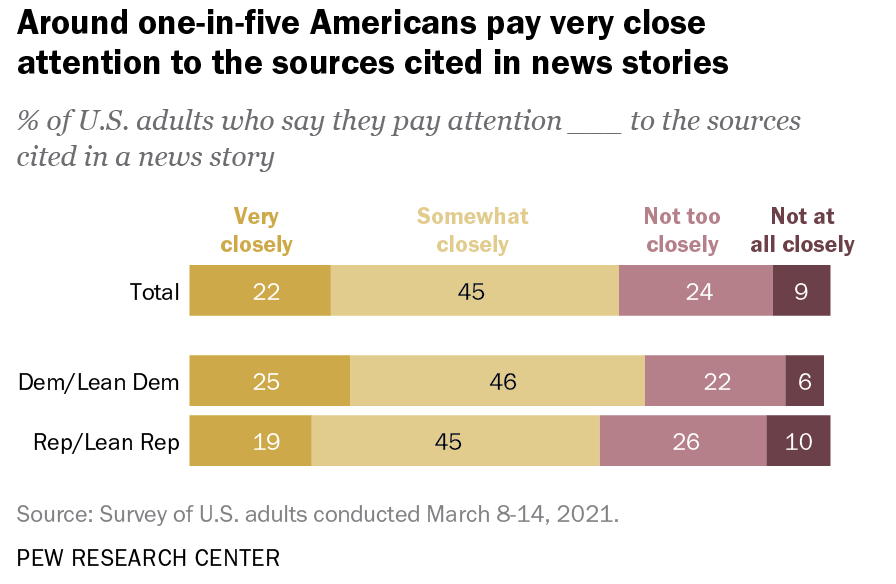
According to Biasly, Esquire has a reliability score of Fair. Although these scores are impressive, it is still important to analyze their work to ensure that its news is reliable.

Source: Pew Research
As seen by the work done at Pew Research, a large number of American adults make note of the sources used in news articles. Trust in news stems from the reliability of the sources journalists use to report on current events and issues. Reliability stems from factors such as accuracy and selection/omission. In this article, we will examine how these factors are present in Esquire’s articles and determine how reliable they are.
Does Reliability Matter?
Reliability, in general, refers to how trustworthy or accurate information, or in this case, a news source is. If we consider this definition, it quickly becomes clear why reliability is important in media sources. If we can’t trust the things we read then there isn’t much of a point in continuing to consume content from that source, after all. So how exactly can we gauge the reliability of a news source anyways?
There are several potential measures of reliability to look out for when trying to determine whether a media source is reliable or not. Red flags for an unreliable article can include the presence of wild unsubstantiated claims, facts dependent on other unreliable sources, heavy use of opinionated language, and more. Some indicators of a reliable news source, on the other hand, include things like:
- Absence of subjective/opinionated language in articles
- Credible sources cited (e.g., neutral sources, .gov, .edu websites)
- Facts and statistics backed by multiple relevant outside sources
- Use of primary sources when possible (e.g., interviews, quotes)
- Information that remains consistent across news sources
So How Does Esquire Fare in its Reliability?
The political reliability index developed by Biasly objectively assesses news organizations’ accuracy and trustworthiness. Esquire’s overall Reliability Score has been rated as ‘Fair’ by Biasly. This rating is a weighted average of two distinct scores: the Fact Analysis Score and the Source Analysis Score, each evaluating separate components of Esquire’s Reliability. When computing the Average Reliability of the article the Fact Analysis score is more heavily weighted. These ratings are as follows in the next two paragraphs:
Esquire’s Fact Analysis Score is ‘Fair,’ which suggests readers can trust some of Esquire’s content online. The Fact Analysis score focuses more on the accuracy of claims, facts, and sources presented in the article and any hints of selection and omission bias, which we will discuss further in the article.
Esquire’s Source Analysis Score is ‘Fair,’ which suggests readers can trust some of the sources, links, and quotes provided by the news source. This score, which is based on A.I., focuses on assessing the quality of sources and quotes used including their number, lengths, uniqueness, and diversity.
However, since these scores are based on percentages and averages, individual articles could be more or less trustworthy depending on the context, author, and other factors. Our findings show that Buzzfeed’s reliability is mostly but not all factual because they have retracted several stories in the past or had pieces that were not factual.
Let us analyze the supporting data for Esquire’s rankings and discuss what to watch out for while searching for trustworthy news sources.
Esquire Accuracy and Reliability
News companies are under constant observation regarding possible pitfalls when it comes to their accuracy and reliability. In a society where misinformation is prevalent, it is important to ensure that the news is accurate and reliable. To better understand the extent of these two factors about the Associated Press’ work, we will focus on accuracy and selection/omission ratings.
Selection bias is when stories and facts are selected or deselected, often on ideological grounds, to create a narrative in support of the new sources’ ideology. Omission bias, on the other hand, is when different opinions and political views regarding a situation are left out so that the reader is only exposed to the ideological perspective supported by the author. It’s important to keep in mind these two types of biases when trying to assess an article’s level of accuracy.
Biasly assigns a percentage score to accuracy, with one being the least accurate and 100 being the most. Ratings are calculated by weighing assertions with supporting evidence, the number of reliable internal sources, and the number of reliable external sources employed.
News sources can vary by article when it comes to their accuracy. A contrast to Esquire would be the New York Post. Biasly views the Post as a Very Conservative news outlet. One of their articles, “Biden Meets with Sen. Manchin as spending agenda hangs in Balance”, received a reliability score of Good. On the other hand, an article titled, “Texas bill would give unused covid funds to farmers to pay for migrant damages”, received a reliability score of Fair. Both articles show that the New York Post is not consistently reporting on the news in a reliable manner.
In contrast, we can examine an Esquire article called, “Anyone Who Believed Republicans Would Cooperate on a January 6 Investigation Should Lie Down for a Nap”, was rated as Poor when it came to reliability. In terms of bias, it was rated as Liberal. Charles Pierce writes the article in the context of January 6th and its effects on politics. He calls for people to show no remorse for any Republican explanation for the event.
“Unfortunately, right now, it seems like we’re incapable of having the serious or the real conversations about these things because everybody’s trying to utilize it for electoral gain one way or the other,”
“It’s exactly what I was hoping we wouldn’t have, because it’s going to be politicized.”
It is important to note that this article is about the events that occurred at the Capitol on January 6th, 2021. Those events have become a contentious issue in politics and reporting has seen bias in all directions. The quotes represent only a certain side of the issue as they critique Congress’ actions when it comes to creating a Congressional committee to investigate the event. Although quotes improve reliability, there needs to be statements from all sides. For example, adding quotes supporting the committee, especially from a Republican, would help.
The gaps in this story because of the lack of different viewpoints leave too much room for readers to make interpretations. It is clear that the author has a liberal agenda where he wants to portray Republicans as the fully wrong side, where their opinions are not relevant to the issue. This problem starts in the title and continues throughout the text, adding further reasoning as to why this article received a Poor reliability score.
Analysis of Reliability in Esquire’s Online News Articles
It is important to analyze the reliability of news pieces published by Esquire because of its prominence in the field. Although Biasly gave Esquire a score of “Fair” on overall reliability, it will be helpful to examine a few examples and see where Esquire excels and where improvement can be made.
Quality of Sources and Facts Used
Articles can increase their reliability based on the quality of sources and facts that are used. Additionally, analyzing the number of quotes and the length also influences an article’s perceived reliability. Let us examine this article: “So After all that there is no border surge?” This article discusses how the media covered the border from a Republican perspective but provides numbers that apparently tell another story. Although there are multiple statistics, the author includes no quotes. This is a cause for concern because there should be statements that cover both sides of the article. Quotes about the Republican view on the border and quotes that counter their claims would provide a more well-rounded story that allows readers to see both perspectives.
When it comes to the sources and facts used in the article, the author does a great job. Their main source of data came from a government agency in charge of the U.S. southern border, Customs and Border Patrol. Additionally, the author included figures that are at the heart of the argument. It was mentioned that there was a 28% increase in border apprehensions during February 2021. In the best example of the author using data, they mentioned how Trump saw border apprehensions increase 31% during his term which goes against the media’s rhetoric about how activity at the border is surging and that there is a crisis.
The article shows that authors can get parts of reliability correct. The use of statistics to back up his claim that the media is overblowing the border situation is a good way of showing reliability. It shows readers that there is credibility to what is being written and is productive in changing the narrative as the author wants to do here. On the other hand, the lack of quotes still leaves room for interpretation. Readers may fail to fully believe what the author is writing because there are no statements from CBP officials, politicians, or independent researchers about the border situation or the data mentioned in the article.
Selection and Omission Bias
For another example, let’s examine an article titled, “Madison Cawthorn Laid Out the Present and Future of Republican Politics.” The article uses Congressman Madison Cawthorn as a new fixture in Republican politics and how his behavior is a representation of how the party operates now and in the future.
The article introduces some of Cawthorn’s actions and statements. From there, the author attempts to connect his behavior to the rest of the party and ultimately claims that rather than the Republican party dealing with politics, it will now focus on getting attention from the public while not talking about policy.
“I have built my staff around comms rather than legislation,” he wrote.
“There is no longer any Republican platform to deal with the major crises of our moment”
The first quote came directly from Cawthorn who wrote about how he went about hiring his Congressional staff. He is the only figure in the article to have a direct quote. It is a disservice to the reader. If the author is claiming that Republicans are more focused on attention than legislation, there should be more open examples and statements of figures saying such. Purposely leaving out possible statements made by Republicans who are focusing on policy is misguiding the education of the reader. It can affect the perception of the reader and open them up to falling for bias.
The second quote follows a similar theme. Such a strong conclusion based on the word of one Congressman is not correct. It is again an example of selection and omission bias. By only including one Republican’s statement, the author is making a broad generalization about the direction of the party. One person does not represent the thousands of active Republican politicians who are more than likely in office to make a difference for their constituents.
“These folks are just Conservative Media Stars now, people who were throwing red meat online when suddenly it all got real and they were elected to Congress because that’s all that Republican primary voters want anyway.”
The author takes it a step further in the statement he wrote above. Not only has he generalized the politicians and leaders of the party, but he now accuses Republican voters of engaging in the same supposed behavior. Yet again there is no account of any Republican supporting such thought. The author fails to even add quotes that support what he is saying let alone adding quotes that show Republican voters who are invested in the issues and want legislative change. By the end of the article, he only manages to cite Donald Trump as the only other Republican politician who is supposedly engaging in behavior similar to Cawthorn.
The article serves as a good example of what not to do when it comes to selection and omission bias. The author ignores any possible quotes that support his claim or serve as a counterargument. Because of this, the story lacks a well-rounded point of view and will expose the reader to an open interpretation of the Republican party and its voters along with liberal bias.
| Article | Sources and Facts | Selection and Omission |
| Anyone Who Believed Republicans Would Cooperate on a January 6 Investigation Should Lie Down for a Nap | ● Quotes only represent one side of the story
| ● Never offer the reader a chance to hear about Republicans who support the committee |
| So After all that there is no border surge? | ● Does a good job adding facts from a reliable source ● Data is used in the author’s argument, leaving less room for interpretation | ● Could have added more from government officials on the issues aside from Trump |
| Madison Cawthorn Laid Out the Present and Future of Republican Politics | ● Does a poor job as there were few facts and statements ● Supposed facts were from a limited view and used to create broad generalizations | ● Left out the viewpoint and work of many Republicans who most likley represent the opposite trend of politics that the author wrote about |
So is Esquire Reliable?
Esquire has shown a pattern of lacking reliability because of multiple factors. They have shown a tendency to omit viewpoints and not use a preferable amount of quotes. Because of this, using Biasly’s News Bias Checker will assist you with ensuring that the news articles you read are reliable and provide you with correct information.




























